Delicious, healthy meals for camping & day hiking (whole food plant based)
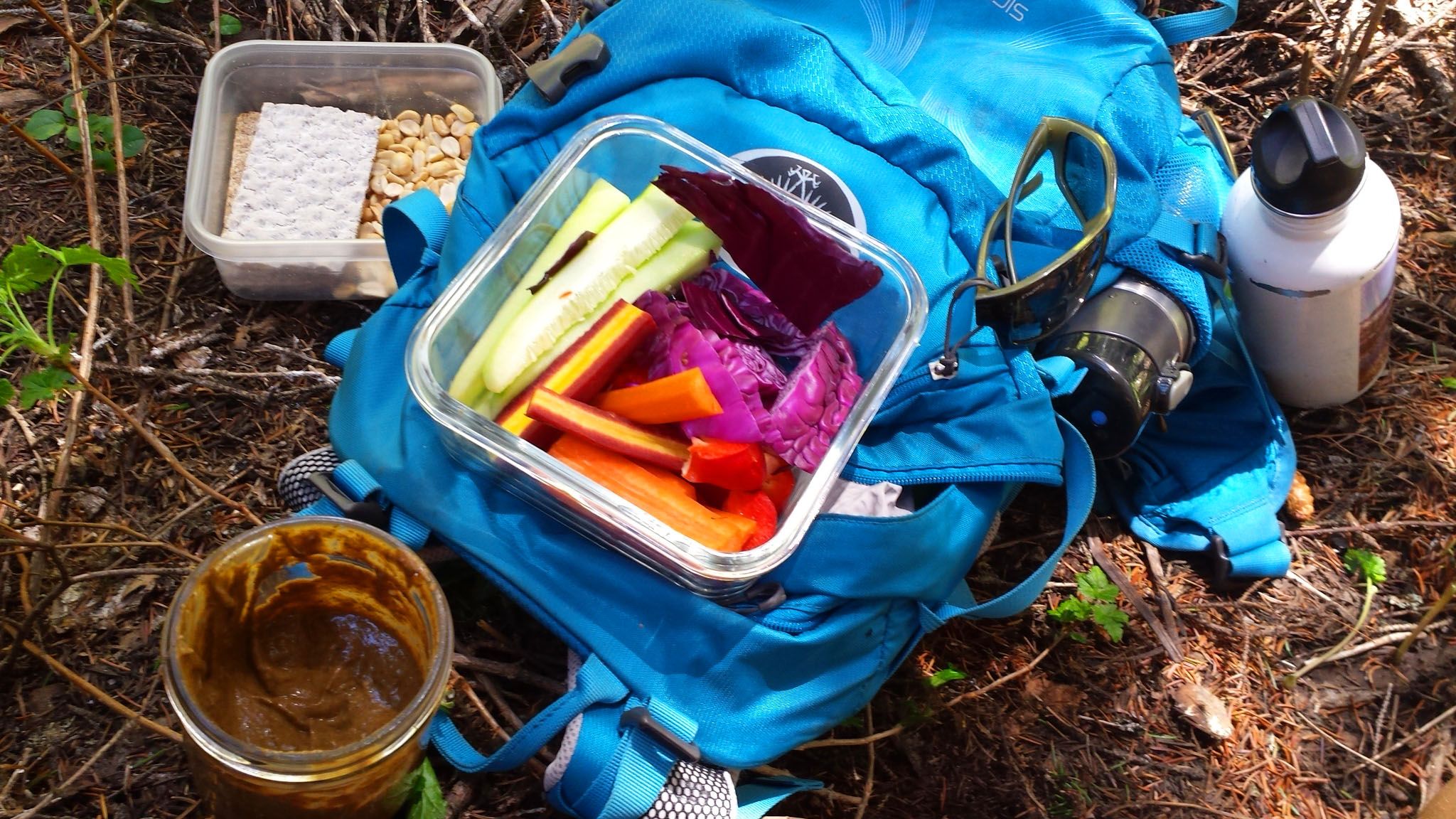
Healthy eating while camping takes some effort in advance, but when you're on the road or the trail, you'll be so glad to have done it! I'd like to share with you some ideas for how I go about prepping food for two whole food plant based eaters. These ideas are best suited to car or RV camping--with access to a small fridge/freezer or ice-filled cooler (I'll cover food for backpacking in a future post). I really hate putting together food on the road, because it's a vacation after all--right? So having it all prepped beforehand makes things so much easier. Just re-heat and serve!
BREAKFAST
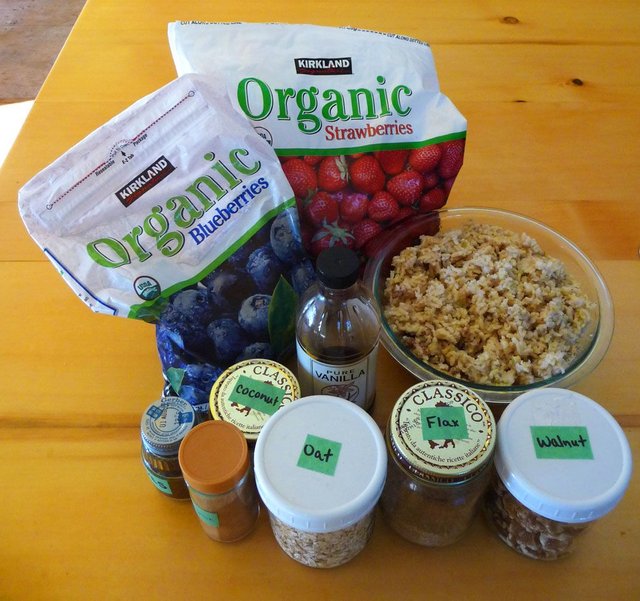
Please don't skip this! You'll especially need to fuel yourself well if you plan to do a long day hike. We love our whole grains, and I generally cook these at home to save time and propane on the road. Some options include: steamed whole or steel-cut oat groats, brown rice, quinoa, millet, amaranth, or teff. I cook up a big batch of one--or a mix--of grains and keep those in the camper fridge in a large glass container. Rolled oats are also good to have for a quick breakfast (I always bring some in case I run out of our precooked grains). I fill individual containers with our favorite "sprinkles" (can also mix the dried stuff in one large container), such as nuts & seeds (e.g., walnuts, chia seeds, ground flaxseed, pumpkin seeds, unsweetened coconut flake), dried fruits (e.g., raisins, mulberries, goji berries), fresh or frozen berries (e.g., blueberries, cherries, strawberries, raspberries), cacao nibs, vanilla extract and ground spices (e.g. Ceylon cinnamon, cloves, cardamom).
LUNCH
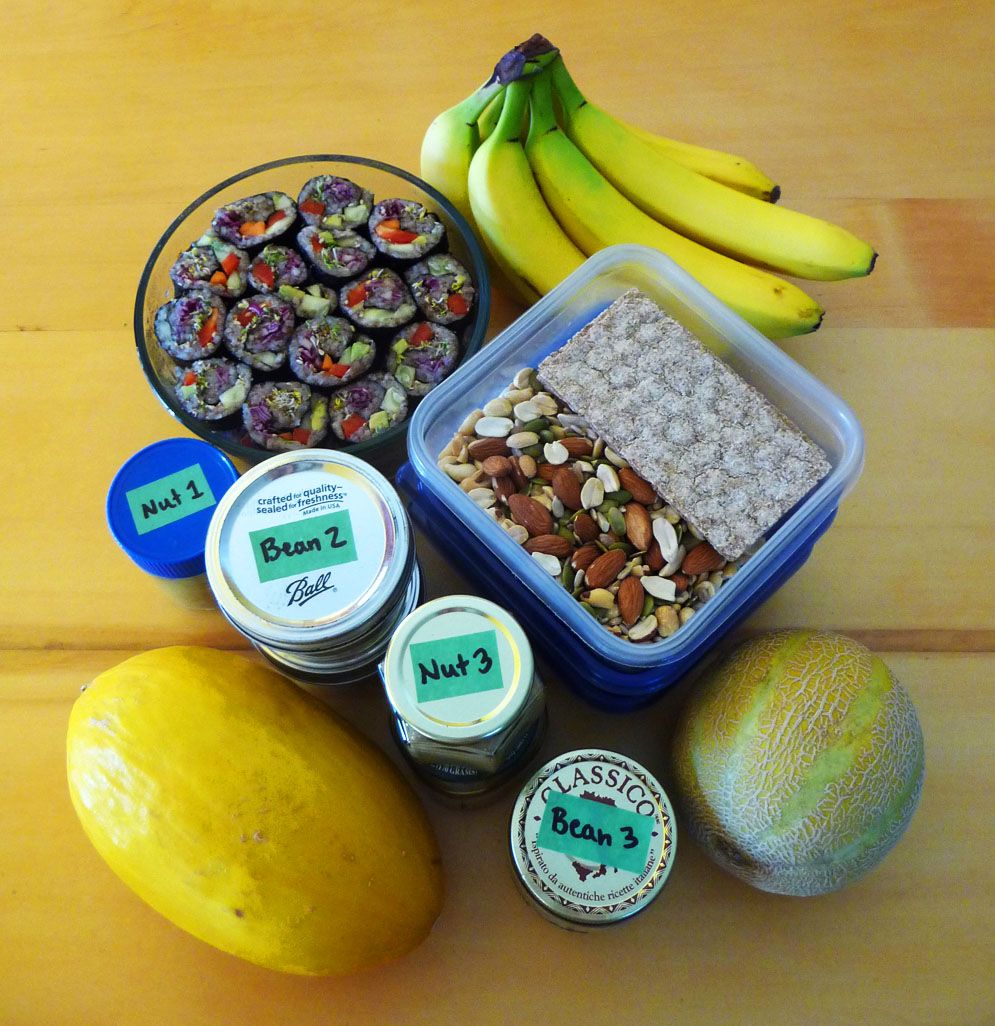
I don't like to include commercial foodstuffs in most of our meals, but if I haven't had a chance to make crackers or whole-grain sourdough bread, store-bought sodium-free rye crackers or brown rice cakes suffice in a pinch. On these, we schmear some nut butter, cheeze spread (containing nuts, nutritional yeast, vinegar and spices), or a bean dip. This is great for lunch or as snacks throughout the day. I also cut up veggies (e.g., carrot, red bell pepper, cucumber, red cabbage) into sticks for dipping in the spread of choice. When I'm really ambitious, I crank out a gob of veggie sushi rolls at home, make a ginger peanut curry dipping sauce, and package those for the camper fridge. We also carry plenty of raw nuts and fresh fruit for snacking. When I discovered some delectable mini-melons at the store, I thought of them immediately as day hike food! We carried them whole in our packs, paused midday for lunch, cut them in half, and scooped out their deliciously cool flesh with our badass titanium sporks. 😎
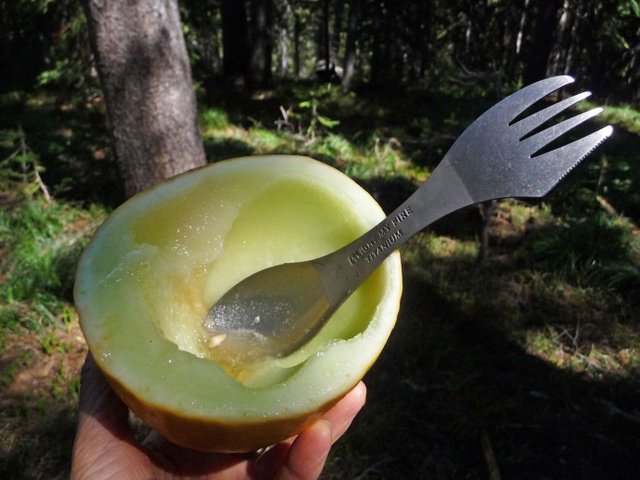
DINNER
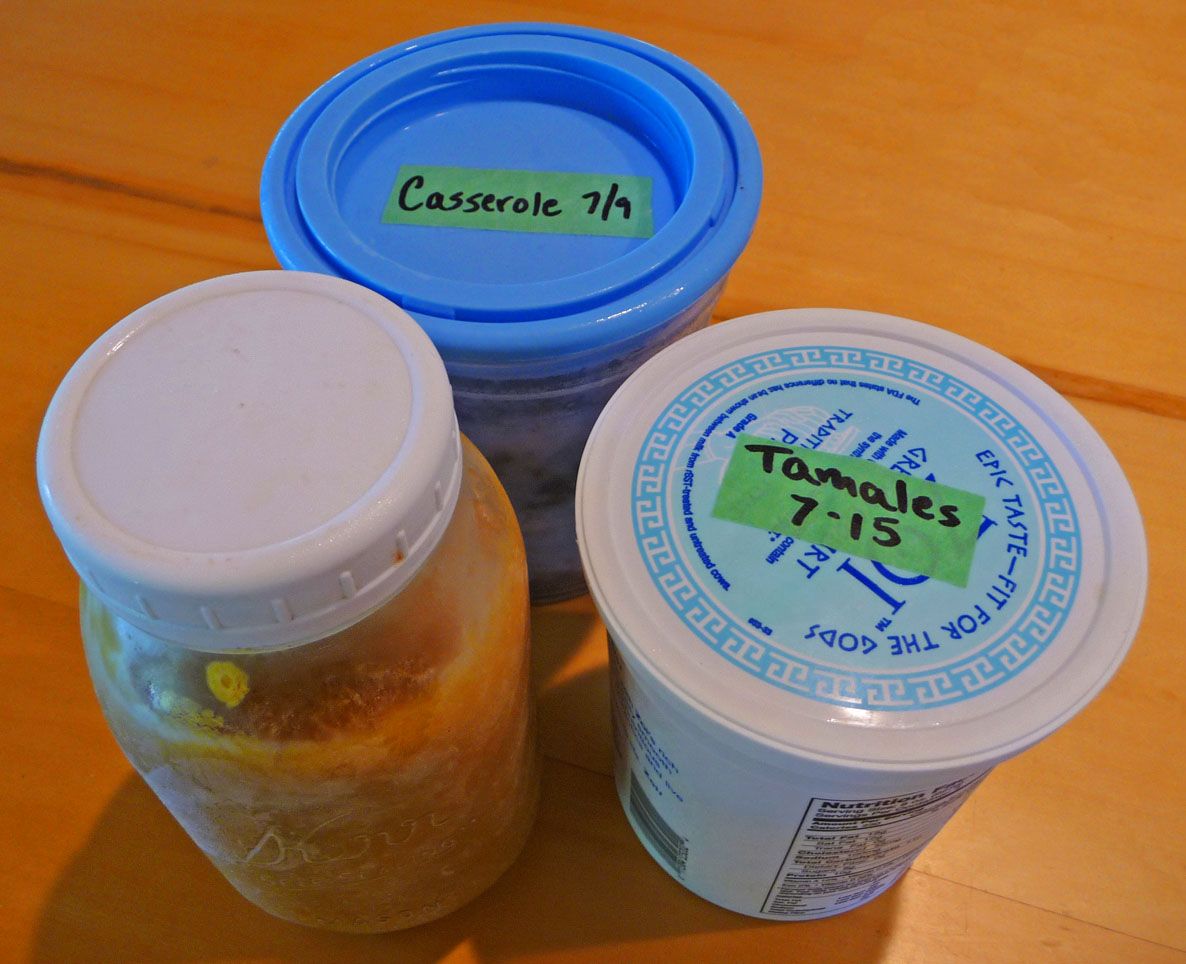
This is where I get really lazy! Whenever we make a huge amount of some kind of food (e.g., casserole, tamales, soup, stir-fry) at home, I package up at least 2 servings in a container that goes in the freezer. Or if I made an awful lot of it, I might even drag out the pressure canner. Ideally, these containers are labeled with the name of the meal and the date. I failed this with one of the items in the photo...I think a squash soup? These prepackaged, home-cooked meals are excellent for taking on the road. Just stick a variety in the camper fridge and thaw one out in the saucepan every night for dinner. Ideally, its a whole meal, meaning it contains all your whole food plant based food groups, so you don't need to mess with any side dishes. We like "sprinkles" on our dinner, too, such as nutritional yeast, pumpkin seeds, salsa, and avocado chunks.
DESSERT
For us, snacks, breakfast and desserts are all about the same. Before bed, we might put together a smaller version of the morning's breakfast, or just have a banana or a handful of nuts or nothing at all. We've found that after over a year of eating whole food plant based, our "sweet tooth" has significantly diminished, and we hardly miss it! Sometimes, I'll bring along "bliss balls", which are essentially some kind of nut or nut butter, whizzed in the food processor with dates, rolled oats and spices, rolled into balls and frozen. I've also made an oil- and sugar-free granola with just oats, banana, raisins, and spices. These can be excellent trail snacks or desserts. Recipes for future posts!
SOME THINGS THAT COME IN HANDY
- Small, leak-proof, lightweight containers: These are for portioning out snacks & dips to carry in your day pack. I have accumulated the perfect-sized containers for transporting crackers, nuts, individual portions of sushi rolls or cut veggies, etc. I'm known to carry 1/2 pint to 1 pint-sized Mason jars in my pack, since I prefer glass over plastic, but you might want to stick to a lighter-weight container. If you are concerned that a container might leak, stick it in a plastic bag with a twist tie or Ziploc baggie. It's a bummer to have to clean out your wet, stinky pack when you get home if you sprung a leak!!
- 2-cup thermos for tea/hot cocoa/coffee: It is lovely to take along on your hike, especially if it's a bit nippy in the morning. I like to bring along small canisters of dried herbs from my garden, like lemon balm, peppermint, and anise hyssop. I then either infuse them in cold water overnight (cool tea for a hot day), or boil water in the morning to make hot tea.
- Minimal kitchenware: Since I'm doing most of the food prep at home, I can generally get away with bringing just one medium saucepan with lid for reheating things. We always bring a couple of sharp knives--one small for hiking (or a folding pocket knife) and one larger. For the two of us, we bring two of everything else: bowls, spoons, mugs, and eating utensils. The titanium sporks are fun for day hiking, but we use actual silverware for breakfast and dinner.
- Biodegradable dish soap, sponge and towel: I bring a small bottle of Dr. Bronner's baby soap for all our personal and dish washing needs. I like it because it is unscented...and biodegradable, of course! We wash dishes back at the camper or near a creek.
- A few Ziploc baggies: Good for collecting wild berries, or for storing leftovers, garbage or leaky jars.
- Some cloth napkins: One per person for the whole trip is fine, unless the trip is longer than a few days or you get them particularly dirty. In a pinch, you can use a clean cloth napkin for filtering tea/coffee (if you forget your strainer/filter), as a handkerchief, or as a bandage for a wound.
Ziplock baggies really come in handy on a camping trip. The most interesting use I found was one night by the fire it started to drizzle. I put our iPod and portable speakers in zip locks. They stayed dry and we still got to listen to music.
That's awesome, @renodakota! Yeah, Ziplocs--along with hankies and duct tape--have endless uses 😊
Yes!
Very nice post, my only disagreement is the jars. So, a few extra tips. My girl & I hiked the Appalachian Trail back in 2012 & learned quite a bit. If you're looking for a more long term hike, reducing weight is the key. All food should go in a ziplock bag to reduce size & weight. Dehydrated fruits & veggies are a great lightweight snack, or addition to oatmeal & ramen noodles. A spork, swiss army knife, & a good stainless mug are the only eating utensils you need, as long as you're ok with cowboy style coffee lol...powdered hummus, dried beans, & a jar of peanut butter are your best sources of protein...as always, pack it in, pack it out. Leave no trace!
Almost forgot, if you have the ability, get a wild edibles handbook for the area you hike. There's nothing more satisfying than picking solomons seal, or spring beauties, or sunchokes, or wild onions, & making a meal out of it.
Absolutely, I have several! My Masters degree was in botany, and I practice a little herbalism as well, so we're well equipped to know yummy from not yummy and poisonous. Except in the mushroom area. I steer clear of that (other than morels), since my expertise is not in that area, and mistakes can be deadly!
Hi there, @lone-sliver, and thanks for commenting! Very cool that you got to hike the AT. Yes, absolutely all of your tips are great for backpacking or day hiking. My post was specifically for the car-camping and RV-er types, though, but in the future, I'll be posting my backpacking food prep tips. I dehydrate fruits and veggies, as well as whole meals that are easy-peasy to rehydrate. With our camper cookstove and refrigerator, though, I don't dip into our precious dehydrated goods. And yes, we definitely don't drag along all that cookware and utensils for the backwoods trips!
Also, @lone-sliver, I don't mind the extra weight of the Mason jars and fresh food in my daypack. I figure it gets me into better shape for carrying a backpack :-)
Yeah, I guess it's just habit for us now, even for dayhiking we still go as minimalistic as possible to keep ourselves light & mobile.
You've been UpVoted via the UpVote Experiment 002 Bot. Depending on my VP & the price of STEEM you should get a $.01-$.03 for your trouble.
Read more about this experiment here.
Thank You - @blueorgy
Thanks for the robovote! If you visit this page in person, @blueorgy, I'd love to know what you really think of my post 😊